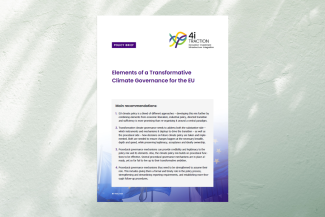
4i-TRACTION (2024): Elements of a Transformative Climate Governance for the EU. 4i-TRACTION Policy Brief. Vrije Universiteit Brussel; Brussels.
Elements of a Transformative Climate Governance for the EU
Based on an analysis of substantive and procedural EU climate policy instruments this brief offers recommendations for EU climate governance to achieve climate neutrality.
Transitioning to climate neutrality requires a transformation of EU climate policymaking. This entails a change from “policy as usual” in what the EU is doing and how it is doing it - requiring ambitious and farsighted policies as well as transformative decision-making processes. Based on an analysis of substantive and procedural EU climate policy instruments this brief offers recommendations for EU climate governance to achieve climate neutrality.
Main recommendations:
- EU climate policy is a blend of different approaches – developing this mix further by combining elements from economic liberalism, industrial policy, directed transition and sufficiency is more promising than re-organising it around a central paradigm.
- Transformative climate governance needs to address both the substantive side – which instruments and mechanisms it deploys to drive the transition – as well as the procedural side – how decisions on future climate policy are taken and implemented. Both are needed to ensure changes happen at the necessary breadth, depth and speed, while preserving legitimacy, acceptance and ideally ownership.
- Procedural governance mechanisms can provide credibility and legitimacy to the policy mix and its elements. Also, the climate policy mix builds on procedural functions to be effective. Several procedural governance mechanisms are in place already, yet so far fail to live up to their transformative ambition.
- Procedural governance mechanisms thus need to be strengthened to assume their role. This includes giving them a formal and timely role in the policy process, strengthening and streamlining reporting requirements, and establishing more thorough follow-up procedures.